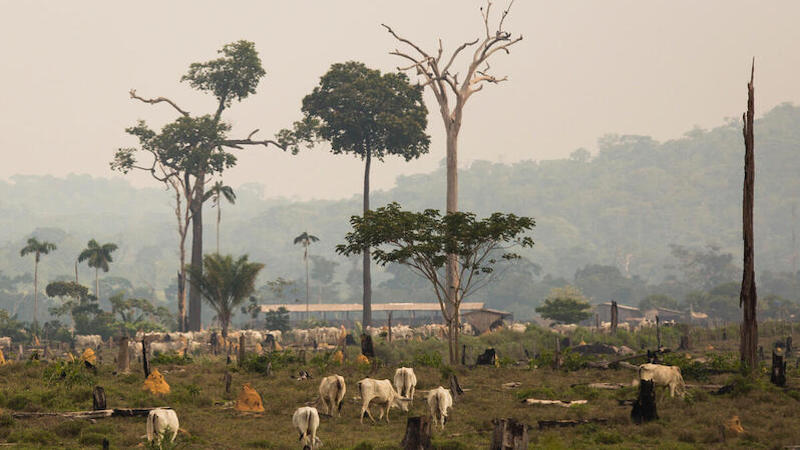Green Climate Fund backs scheme financing farming corporations accused of destroying forests
The fund aims to stop deforestation in the supply chains of major commodities. But campaigners are concerned over money going to big companies linked to irregularities

Cattle raising is one of the biggest driver of deforestation in the Amazon forest. Photo: Bruno Kelly/Greenpeace
The United Nations’ flagship climate fund is giving nearly $190 million to an investment programme that finances some of the world’s biggest farm companies in a bid to preserve tropical forests.
The Green Climate Fund (GCF) approved the project at its board meeting on Tuesday despite opposition from civil society campaigners that accused the “highly dangerous” programme of greenwashing companies linked to deforestation.
The money will support the activities of the &Green Fund, a Dutch investment vehicle that aims to stop deforestation in the supply chains of products like livestock, palm oil and rubber.
The fund claims support from the GCF will avoid emissions of 339m tons, about as much as Poland emits in a year.
Launched in 2017, it counts among its existing backers the Norwegian and UK governments, the Dutch development bank FMO and consumer giant Unilever. Target countries include Brazil, Cameroon, Colombia, Ecuador and Indonesia.
The fund says it offers loans to producers on the condition that they adopt sustainable practices. But campaigners have criticised it for financing companies accused of destroying the environment.
Beneficiaries questioned
Brazilian meat processing giant Marfrig Group is among the seven companies currently listed in the &Green portfolio.
Investigations by journalists and campaigners have repeatedly found evidence of illegal tree cutting to make way for cattle grazing in Marfrig’s supply chain.
Last year the Inter-American Development Bank shelved plans to lead a $200 million financing round for Marfrig after talks reportedly broke off over environmental targets.
The UK’s retreat from climate leadership is not in its national interest
With support from the Dutch fund, the Brazilian company aims to rid its operations in the Amazon of deforestation by 2028.
But its commitment has come under question. A recent Guardian investigation said Marfrig continued to be involved in ‘cattle laundering’, a practice in which animals from a deforesting ranch are moved to a supposedly ‘clean’ farm before slaughter, disguising their origin.
Marfrig said it condemns cattle laundering and any other irregularities.
The &Green Fund has also supported two Indonesian companies that have been accused of growing palm oil and rubber in protected forests.
'Paying the polluters'
Florencia Ortuzar, a lawyer at the Interamerican Association for Environmental Defense (AIDA), says the programme runs contrary to the GCF's principles.
“These companies should have changed their ways years ago, because of laws, regulations and national policies. But they haven’t,” she added. “It is not reasonable to believe the problem will stop by paying the companies behind it. It is paying the polluters instead of having them pay”.
‘Historic milestone’: Ecuador nears vote to keep Amazon oil in the ground
Ortuzar added that climate finance is scarce and this is not how it should be used. The GCF has warned that, unless governments give it more money, it will have to reject or delay projects.
Another point of contention is whether the &Green programme aligns with one of the GCF's core concepts: the paradigm shift.
Projects seeking UN funding need to demonstrate how they contribute to long-lasting change toward low-carbon and climate-resilient sustainable development beyond a one-off investment.
Paradigm shift
In its submission to the GCF, the Dutch bank FMO said support from the UN fund would unlock up to $600 million in additional investment from the private sector.
It claimed private investors currently consider the sector too risky and would be more willing to provide money if a “reputable source of debt financing”, like the GCF, absorbed any potential initial losses.
The GCF will provide a loan worth $180 million and a grant worth $9.35 million. The project's proponent said this support could change how financial markets as a whole approach agriculture and supply chain finance.
But an independent technical review of the proposal, commissioned by the GCF, cast some doubt over the 'paradigm shift' potential. "
The transactions in the current &Green Fund portfolio are with major agricultural market players who typically do not struggle to access finance for overall operations," the report said. "It is not clear whether the incentives are in place for further market uptake by other sources of finance".
Despite finding that "challenges remain", the advisors endorsed the proposal.
In a statement prior to the approval, a coalition of NGOs said the &Green Fund is not a "huge investment in transformative or paradigm-shifting climate action, but rather in business-as-usual practices that have proven to undermine environmental integrity, effectively greenwashing the very practices that must stop".
The GCF supports developing countries to cut emissions and adapt to climate impacts. It is funded by government money, mainly from developed countries.
FMO declined to comment, while &Green and the GCF have not responded to a request for comment at the time of publication.
Read more on: Climate finance | Green Climate Fund
No comments:
Post a Comment